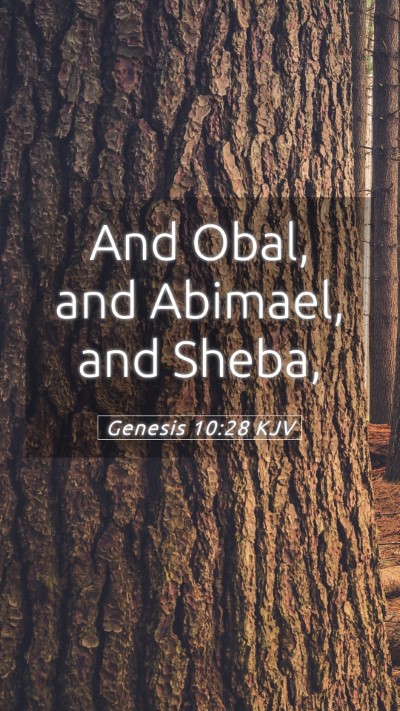Bible Verse Commentary on Genesis 10:28
Genesis 10:28 states: "And Obal, and Abimelech, and Sheba, and Ophir, and Havilah, and Jobab: all these were the sons of Joktan." This verse is part of the genealogical table that provides insights into the descendants of Noah's son Shem. Understanding this verse requires a grasp of its context within the broader structure of the genealogies in the Bible.
Overview of the Verse
This passage lists several names, specifically the sons of Joktan. Each name carries historical significance, representing different tribes and nations that descended from Joktan. The genealogy serves to show the spread of humanity after the flood, confirming God's command to populate the earth.
Understanding the Family Line
The names mentioned often refer to regions or tribes known to the ancient world:
- Obal: Likely referenced a place known for trade.
- Abimelech: A name that would resonate with leaders in Canaanite history.
- Sheba: Associated with a wealthy kingdom, often mentioned in the context of trade.
- Ophir: Known for its abundant wealth and precious resources, often tied to Solomon's trade.
- Havilah: A region noted for its gold and spices, indicating prosperity.
- Jobab: Less is known about Jobab, but his name is included to complete the lineage and signify a branch of Joktan's descendants.
Commentary Insights
Matthew Henry emphasizes that genealogies, such as the one found in Genesis 10:28, serve a significant purpose in scripture. They trace the lineage of nations and shed light on the historical context of Biblical accounts, allowing for a deeper understanding of God's design and human history.
Albert Barnes notes that the mentioning of these names illustrates the fulfillment of God’s promise to Noah that his descendants would populate the earth. Each name represents a development in human history, showing how God’s plans unfold through generations.
Adam Clarke provides insights into the implications of these names. He points out that many of these names correspond to geographical areas that provide context for the migrations of these tribes, enriching the historical understanding of the Biblical narrative.
Significance of Genealogies in Scripture
Genealogies not only record history but also fulfill Biblical themes:
- God’s Faithfulness: They demonstrate God’s faithfulness to His covenants with humanity.
- Identity: They anchor the identities of nations and tribes within God's redemptive plan.
- Historical Context: They provide context for understanding later Biblical events and prophecies.
Cross References
This verse can be cross-referenced with:
- Genesis 10:1 - The general genealogy of the sons of Noah.
- Genesis 11:10-26 - The lineage of Shem, providing further context to Joktan's descendants.
- 1 Chronicles 1:19-23 - The genealogical records in Chronicles that highlight the descendants of Abraham and beyond.
Application of Genesis 10:28
Understanding this verse is crucial for grasping the historical backdrop of the Old Testament. It provides a glimpse into how families and nations developed after the flood and serves as a reminder of God’s overarching plan for humanity.
In Bible study groups, using Genesis 10:28 can stimulate discussions about the importance of lineage and the fulfillment of God’s promises through generations. Online Bible study resources can help unpack the names and their significance in greater detail.
Conclusion
Genesis 10:28 is not merely a list of names; it encapsulates the essence of Biblical genealogies that map the unfolding of historical and spiritual heritage. Engaging with such passages enriches our Bible verse understanding and fosters deeper Biblical exegesis within our study practices.


